Lion’s mane mushrooms are more than just an oddity in the realm of edible fungi—they may also benefit your canine companion!
If you’re here, you’re likely interested in adding this unique species of mushroom to your dog’s diet.
But first, it’s important that you understand what the potential benefits are, how much you should give your dog, and how to properly introduce this fungi into their diet. We’ll also cover some of the best products in the industry.
Let’s dive in!
What are lion’s mane mushrooms?
Lion’s mane mushrooms - scientifically known as Hericium erinaceus (or H. erinaceus) is a gourmet and medicinal edible fungus that falls under the family Hericiaceae in the order Russulales. Lion’s mane mushrooms are named for their shaggy appearance that resembles - you guessed it - a lion’s mane. But this fungus isn’t unique just because of its texture.

Lion’s mane is an incredibly versatile mushroom. Not only is it being studied for a number of medicinal and functional purposes, but it’s also absolutely delicious to eat.
Lion’s mane is one of the rare mushrooms that’s considered both gourmet and medicinal.
Lion's mane mushroom benefits for dogs
If you’re here, you may have heard that some dog owners are using lion’s mane mushrooms as a supplement for your dog’s overalland cognitive health.
That’s because lion’s mane mushrooms have a number of functional and medicinal benefits that may include:
- Immunomodulatory benefits - In one study, shrimp that were fed powdered lion’s mane mushroom had a significantly improved immune response to the pathogen Vibrio alginolyticus compared to shrimp that didn’t receive the mushroom. The study showcases how the mushroom was able to enhance the immunity and disease resistance after taking lion’s mane.
- Antitumor properties - The high beta-glucan and fungal polysaccharide content of medicinal mushrooms like lion’s mane have been studied for decades for anti-tumor activity, anti-cancer activity, and cancer treatment support. One review outlined the possible benefits of the compounds in lion’s mane to act as chemotherapy agents.
- Improved gut health - In one study, mice were fed polysaccharides from lion’s mane mushrooms for 28 days and saw improvement in increasing good bacteria in the gut while also decreasing the bacteria Rikenellaceae and Bacteroidaceae.
- Neuron growth promoting effects - One study examined the mycelium of lion’s mane and showed that “Erinacines E and F exhibited potent stimulating activity against NGF synthesis by astroglial cells.”
- Stimulated brain cell growth - One study showed that lion’s mane exhibited neurotrophic properties by initiating nerve growth factor synthesis in cells, thereby enhancing nerve growth and improving cognitive function.
- Improved cognitive function - A relatively small trial with humans displayed benefits for those with mild cognitive impairment (MCI). In this study, participants who took lion’s mane over 16 weeks showed “significantly” increased cognitive function scores when tested. But it’s important to note that those scores dropped to baseline when they stopped taking lion’s mane.
It’s important to note that some of these studies were in vitro/vivo, some were on animals like shrimp and mice, and some were very small studies with humans.
This means there isn’t any clear scientific research to support this list of benefits for dogs, specifically.
As is often the case with promising natural remedies, it takes time and a large amount of public interest - not to mention funding - to support the clinical trials needed to say there’s a clear benefit to giving your dog a lion’s mane supplement.

However, many dog owners are choosing to give this natural supplement a try.
Our goal is to provide you with the insight and knowledge we have today so that you can make an informed decision with your veterinarian about whether lion’s mane is a good supplement choice for your pet.
Why would I give my dog lion’s mane?
In addition to the overall benefits to body and mind we listed above, many dog owners are excited about the potential benefit of lion’s mane to support dogs with degenerative myelopathy (DM), dementia, an unbalanced gut, and more.
For a complete guide to the potential benefits of lion's mane, check out this guide.
Using lion’s mane to support canine cognitive decline in dogs
As our pets age, their cognition tends to decline. Dog dementia is often referred to as Canine Cognitive Decline (CCD).
Canine Cognitive Decline mirrors the symptoms of altzheimers in humans and can include:
- Confusion and disorientation
- Changes in how they behave and interact
- Activity changes
- Accidents in the house
- Interrupted sleep and sleep cycles
Preclinical research shows a correlation between lion’s mane and a reduction of inflammation and the biological markers of Alzheimer's, an improvement in general cognition, and improved nerve factor growth - all of which may help to support an improvement of CCD symptoms.
The good news is, in very limited research with humans, no adverse effects were reported when taking lion’s mane for cognitive health.
Of course, we shouldn’t correlate these results directly with the benefits or effects for your dog. But we found it important to note here.
There is some anecdotal evidence from one of the companies we love - RealMushrooms - who gave lion’s mane supplements to Veterinarians treating dogs with CCD.
Some of the reported benefits of giving lion’s mane to dogs included:
- Holding eye contact
- Finding dog door when they couldn’t previously
- More engaged with & attentive to owners
- Not getting lost in house/familiar surroundings
- Picking up and playing with toys
- Initiating play with owners
- Less inappropriate vocalization
Remember, this was anecdotal evidence collected by a company looking to sell a product, and not a formal study.
Still, we think social support can be meaningful when there isn’t enough scientific evidence to support a supplement.
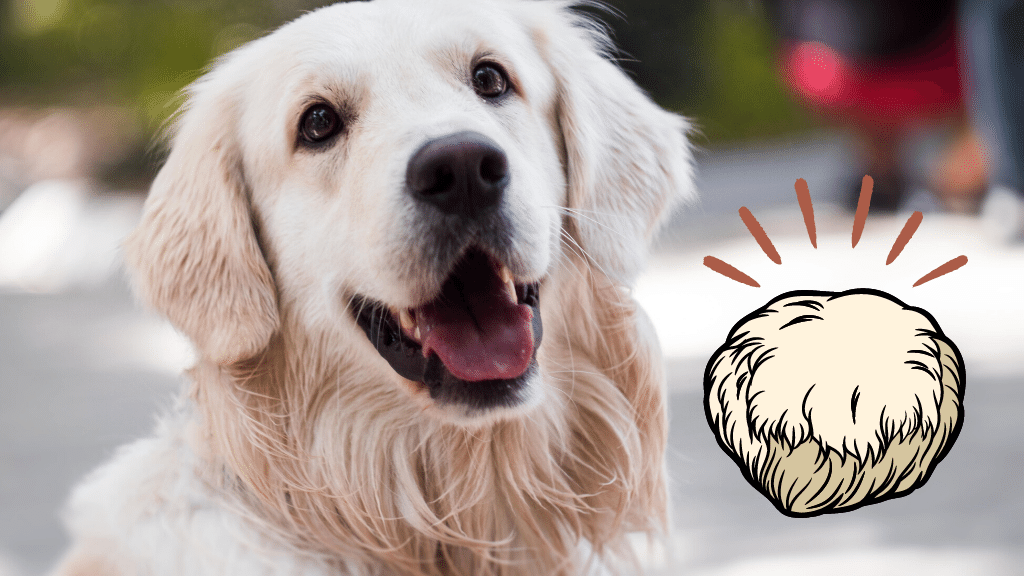
Using lion’s mane to support degenerative myelopathy in dogs
According to VCA Hospitals, degenerative myelopathy is
“A disease affecting the spinal cord, resulting in slowly progressive hind limb weakness and paralysis. The symptoms result from degeneration of the white matter of the spinal cord. DM is similar to some of the forms of human amyotrophic lateral sclerosis (ALS) more commonly known as Lou Gehrig’s Disease.”
The cause of DM is unknown and it is notoriously difficult to diagnose due to its early resemblance to more common ailments like arthritis.
Lion’s mane has shown in vivo to support the regeneration of the myelin sheath - which is good news for dog owners hoping to support traditional treatments for DM with natural supplementation.
Using lion's mane as an overall health supplement for dogs
Lion's mane has a lot of potential health benefits for the body and mind, and some of these may be true for dogs.
In addition to the potential for improved cognition and nerve repair, lion's mane has shown promising results for gut health, immunity, and more.
Can dogs eat lion's mane mushrooms?
Lion’s mane mushrooms are mild-tasting and are generally considered safe to give to dogs as both raw mushrooms and as powdered extract supplements.
It’s important to ensure there are no other ingredients in your supplement that may be unsafe for dogs. And it’s also important to not cook lion’s mane in oils, spices, or with other ingredients that dog’s don’t tolerate well.
Always, always, talk to your veterinarian before introducing a new food or supplement to your dog’s routine.
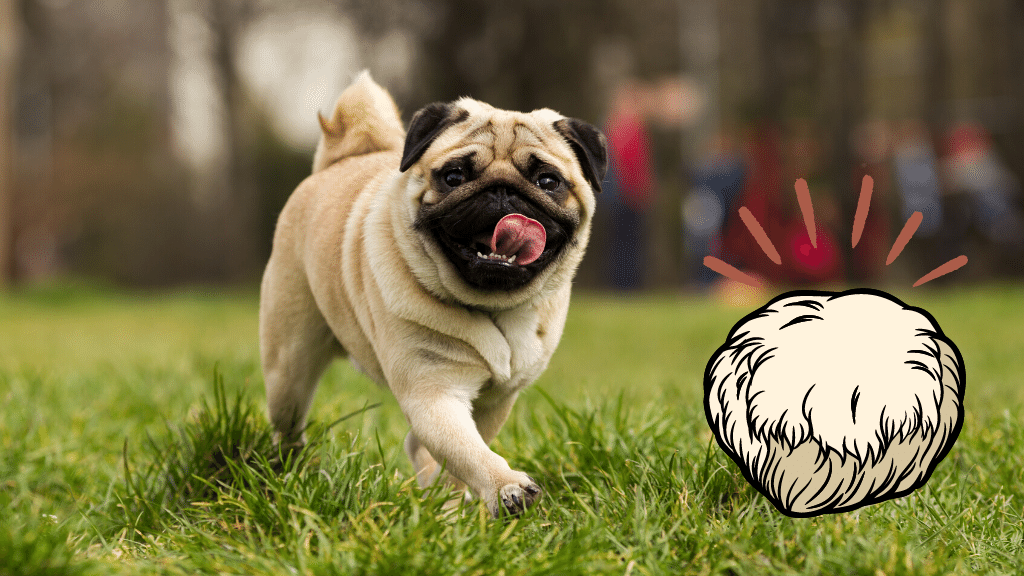
Are lion's mane mushrooms safe for dogs?
There isn’t enough research to support whether lion’s mane can interact with your dog’s medications or to support a list of common side effects. This is why it’s critical to speak with your vet before giving your dog a natural supplement.
However, lion's mane is generally considered to be a very safe supplement for your dog.
There are a number of reputable companies that sell lion’s mane supplement products for dogs that have many positive reviews. After a cursory glance at these reviews, there doesn’t seem to be any indication of a bad reaction.
Some dogs may be allergic to lion’s mane mushrooms. Others may experience GI upset, especially if they tend to be sensitive to other mushrooms or new foods.
Owners should be vigilant and report any sudden changes in mood, behavior, appetite, or GI upset to their veterinarian and stop supplementation immediately.
We wrote up a complete guide of which mushrooms are safe for your dog here!
Should I give my dog raw lion’s mane mushrooms or a supplement powder?
This is an important distinction that we feel is worth some explanation.
Lion’s mane mushrooms have many beneficial compounds. But these compounds are hidden behind the mushroom’s tough cell exterior wall called chitin.
When feeding lion’s mane mushroom to your dog, many of these beneficial compounds won’t be accessible because they’re trapped beneath the chitin. The compounds will pass through the GI tract without being absorbed properly.

Chitin is very difficult to digest, which is why many supplement companies pre-extract the mushroom for easier digestion and access to the beneficial compounds.
In other words, raw mushrooms may not present the strongest functional benefit to your dog.
You should look for a supplement powder that has been hot-water extracted and uses 100% of the mushroom’s fruiting body.
Hot water extraction of the fruiting body helps to release those beneficial compounds in a process known as mushroom extraction.
You also want to be mindful that you aren't buying lion's mane powder - which is simply ground-up raw lion's mane mushrooms. Look for that hot-water extraction process!
There are many questionable mushroom companies out there. So make sure you buy your product from a reputable brand.
Here are some of our favorites based on our unbiased research. Here at Remeday,
The best lion’s mane products for dogs
Here at Remeday, we are not only mushroom lovers, but dog lovers as well. Our staff dogs, Chonky and Arya, have both taken mushroom supplements for health and longevity.
But as dog owners, we also know that it can be hard to know which products are right for your dog. This is especially true if you're looking to support a particular condition, such as cognitive decline or even canine cancer.
Here at Remeday, our primary goal is to help you find the best mushroom products. We only ever recommend products we have completed extensive research on, have tried ourselves, and would recommend to friends and family.
The good news is, there are wonderful mushroom supplement companies out there! Here are some of the best ones:
1. Real Mushrooms: Lion’s Mane Extract Capsules for Pets
We love RealMushrooms for a number of reasons. They create supplements using high-quality mushrooms using 100% fruiting body. This means your pet will have the highest chance of getting the most beneficial compounds from the product. These easy-to-administer capsules can be hidden in your dog’s favorite treat for easy dosing. RealMushrooms is a great choice if you want to hide your dog's dosage in a tasty treat!
2. Shroomies for Dogs
If you want to give your dogs all the benefit of lion's mane, plus other dog-friendly functional mushrooms (like shiitake and turkey tail), then Shroomies is the blend for you. We've been lucky enough to chat with the owners of FreshCap. As dog lovers AND mushroom experts, we are certain that this blend is perfect for the dog owner looking for a well-rounded mushroom supplement. In fact, we've even given these to our own dogs - Chonky and Arya!
3. Four Leaf Rover: Mushroom Extract for Dogs
This third-party tested mushroom extract comes in a powder form and is easy to sprinkle over your dog’s kibble. Best of all, the approachable pricing enables you to give your dog lion’s mane for between $0.17 - $1.50 per day!
Can I use other lion’s mane supplements for my dog?
Of course. There really isn’t any difference between a capsule or powder produced ‘for dogs’ and the ones made for ‘humans’ except for packaging, dosage details, and more.
With that in mind, we also really love Mushroom Revival’s lion’s mane powder as an option for your dog that’s not necessarily marketed for dog use.
Just be sure that you choose a high quality brand. And double check that the only ingredients in what you choose is hot-water extracted lion’s mane (and not flavors, fillers, or other supplements).
Looking for more? We put together some of our top recommended mushroom supplements for dogs here.
How much lion's mane to give to your dog
Many supplements recommend 300 mg of lion’s mane extract for every 20 lbs of your dog’s body weight. So a 60 lb dog could take 900 mg of lion’s mane extract powder.
Take a look at your package directions for the ideal lion’s mane dosage for your dog. The dosage is usually adjusted by your dog’s body weight.
If you’re measuring your powder with a measuring spoon, here’s aguideline for a lion's mane powder extract product.
|
Your Dog’s Body Weight |
Amount of Lion’s Mane Extract Per Day |
|
1-30 lbs |
1/16 tsp daily |
|
31-60 lbs |
1/8 tsp daily |
|
61-100 lbs |
1/4 tsp daily |
|
101 + lbs |
1/2 tsp daily |
Always speak to your veterinarian about proper dosage amounts.
We recommend starting with a very small dosage for a couple of days to evaluate whether your dog has any adverse reactions before administering a full dosage.
You might find that your dog responds well to having half of their recommended daily dosage with breakfast and half daily dosage with dinner.
As with many health supplements, you shouldn’t expect to see a major change by administering lion’s mane. Lion’s mane is meant to support your dog’s overall health. With that in mind, it may take 30-60 days to see any improvements. You may not see any improvements at all. Lion’s mane is an incredible functional mushroom, but it’s not a miracle drug.
And until more research is completed for dogs, specifically, we won’t know what the potential outcomes can be.
Are other mushrooms good for dogs?
Yes! Many medicinal and functional mushrooms are generally considered safe for dogs. Check out our complete guide to giving turkey tail to your dog to learn more.
As always, the team of humans behind this article are happy to point you to more resources to continue your research. Simply contact us today.

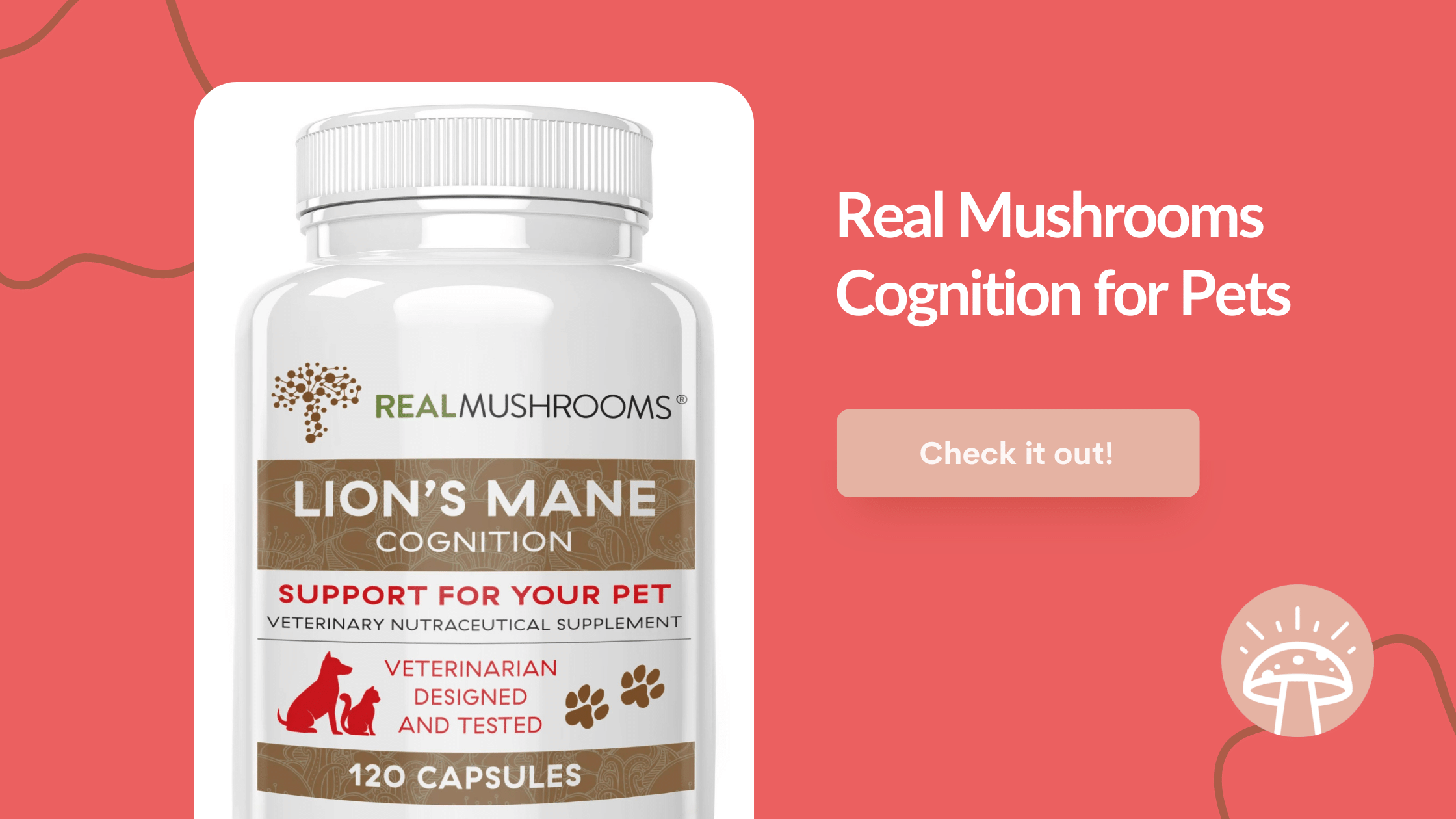
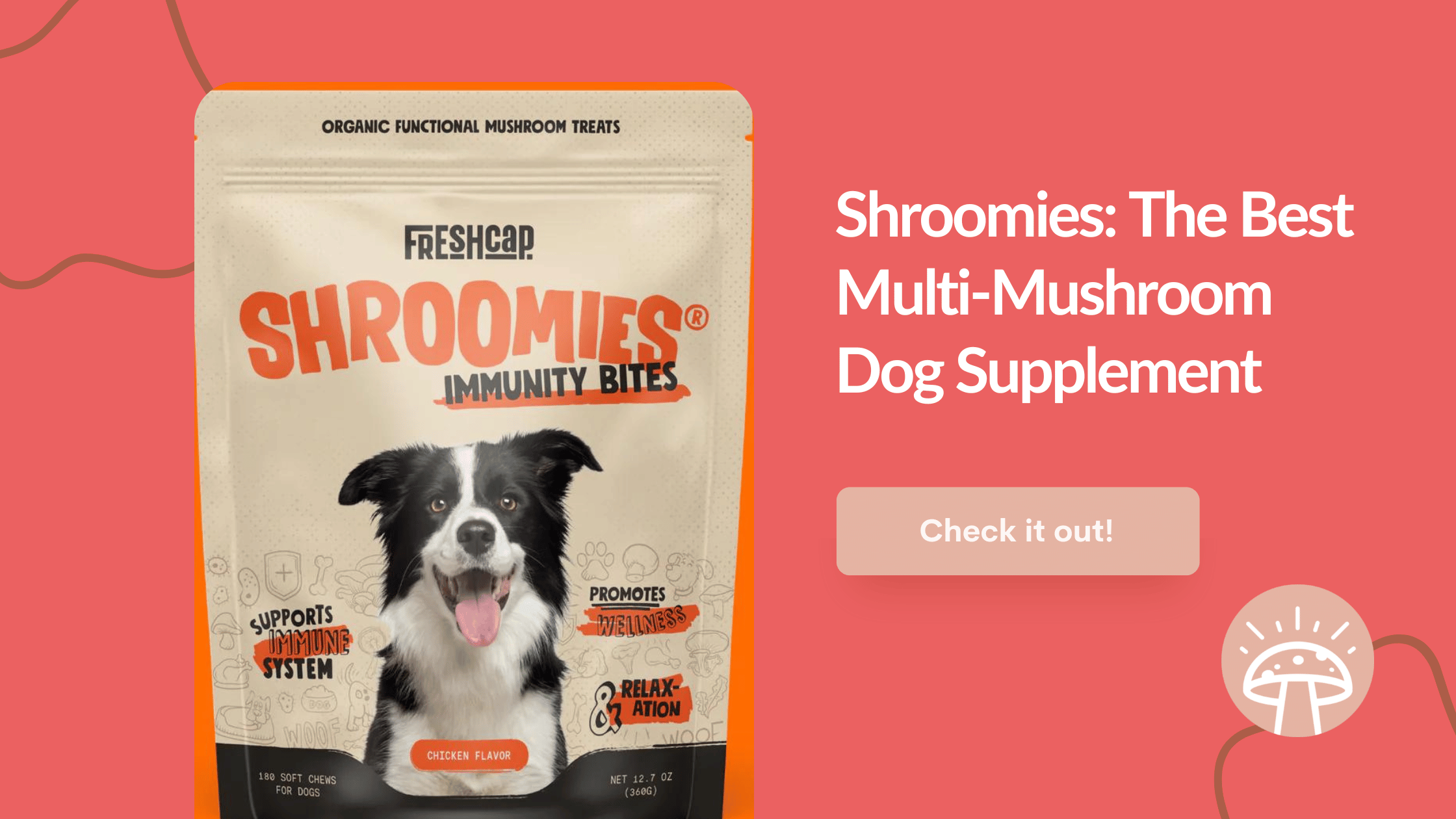
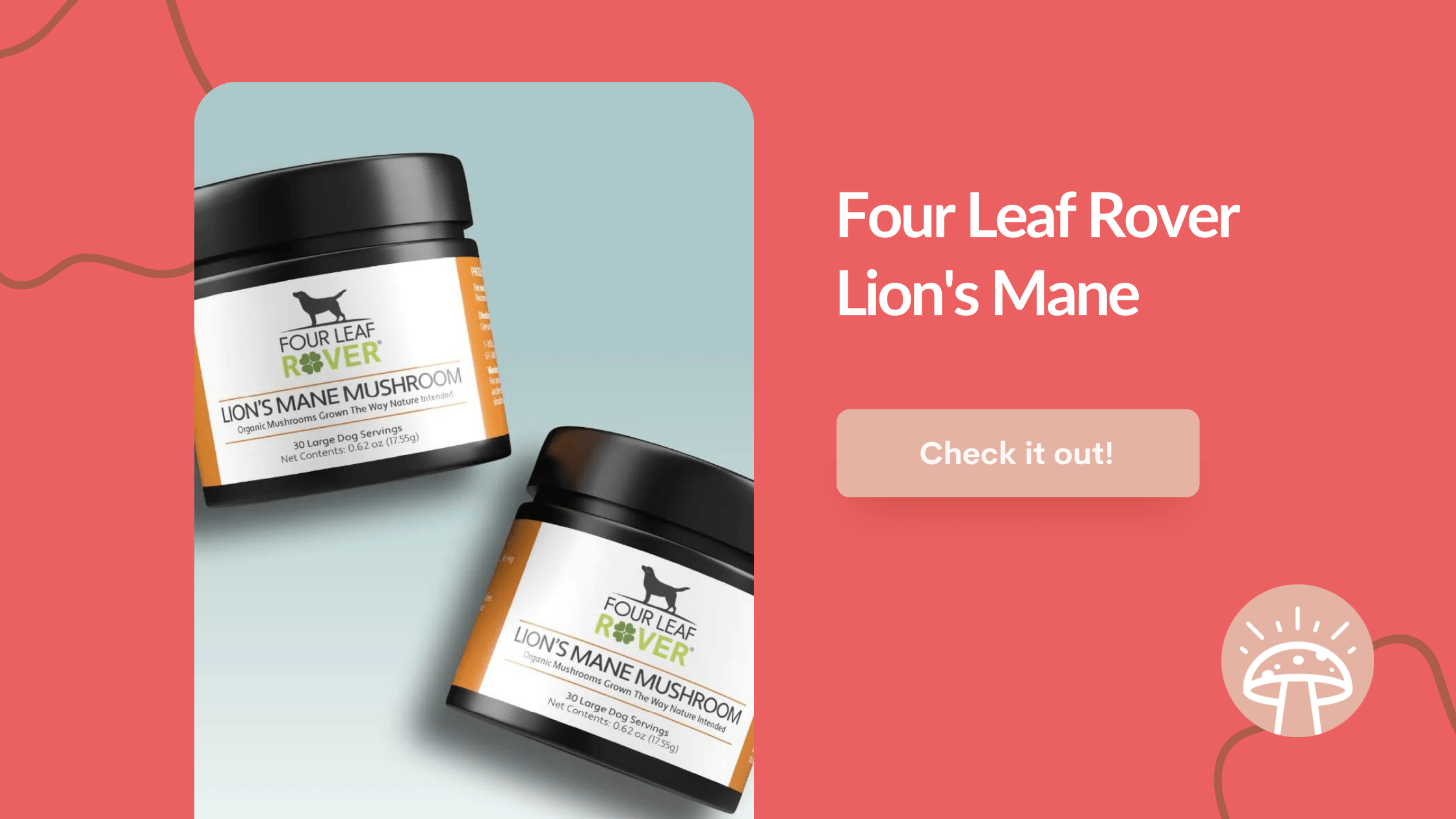


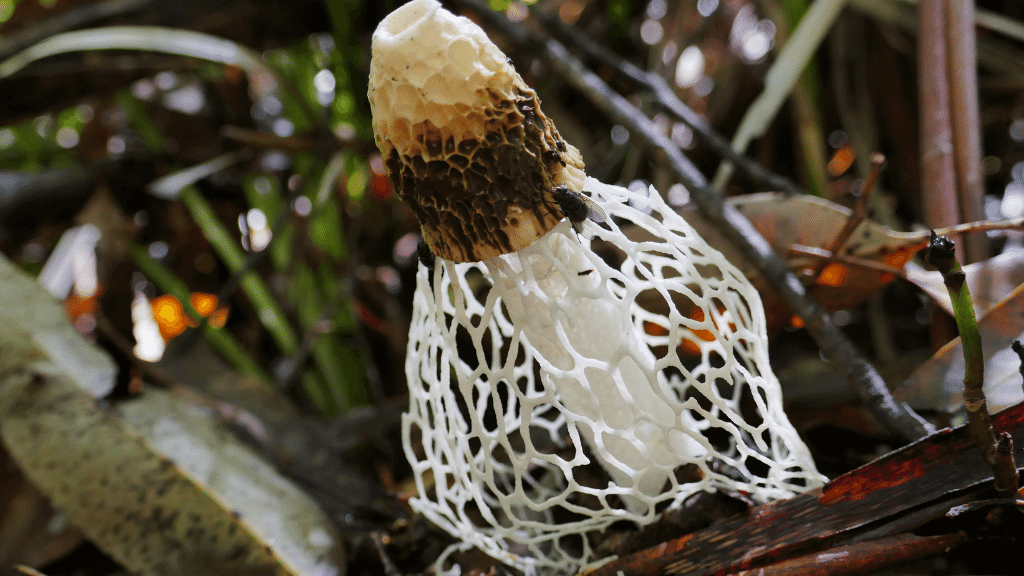



.png)
